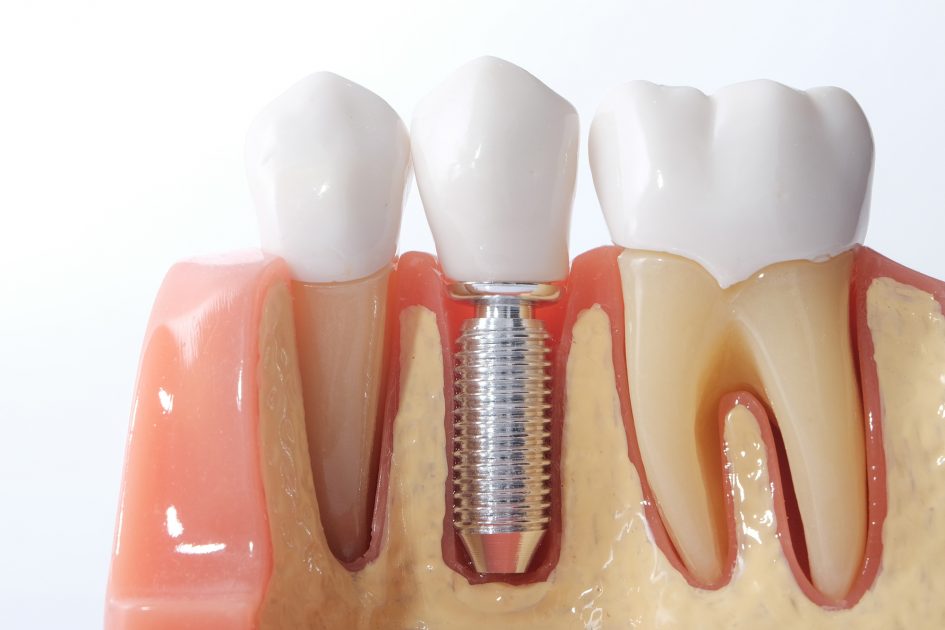A smile is probably one of the most important components of a person’s charm, and charming people find it easier to communicate with others and achieve their goals. Implantation, the surgical replacement of missing teeth, can correct your smile. Today, it is one of the most effective and long-lasting methods of tooth replacement.
Dental implants or dentures are complex titanium structures that are screwed into the human jawbone by a dentist. Implantation operations are carried out exclusively in professional clinics after detailed examinations and consultations.
Dentures were invented by our distant ancestors, whose food was completely natural and solid. Some texts from ancient Rome have reached us, giving evidence that jewellers and barbers of those times worked on dental prosthetics quite professionally for their level of civilization. The artificial teeth were made of human or animal bones and fixed with precious metal wire.
Today dentures have two tasks: restoration of the chewing function and aesthetics of a smile. Prosthetics also protects and preserves dentition and supports the operation of the mandibular joint.
Reasons for Getting Implants
There are many indications for implantation. It is important to consider diseases, especially cases of periodontal disease. Nowadays, various titanium supports have been developed to replace affected parts of the jaw and teeth.
Remember, self-diagnosis and determining diagnoses on your own can be harmful to your health. However, you can learn more about the indications and recommendations by reading this article about permanent dentures.
Implants are recommended in the following cases:
- When there is a single defect in any part of the jaw;
- Combined defects (large or extensive areas of missing teeth combined with unilateral or bilateral defects of chewing teeth);
- Unilateral and bilateral end defects;
- Complete edentulism, as removable dentures cannot be installed on completely toothless jaws;
- Asymmetry and malocclusion due to temporomandibular joint dysfunction in cases of prolonged multiple edentulism.
Materials for dental implants
The best dental implants have an anatomical shape to closely replicate the natural root system and form of the missing tooth. Implants are traditionally made of titanium and its alloys, offering several advantages:
- Durability;
- Corrosion resistance;
- Functionality;
- Hypoallergenicity.
In fact, only after examining the oral cavity by a surgeon, studying dental images, and assessing the overall health, can doctors determine which dental implant is best to install. Read more at [whiteclinic.com.ua/clinic-services/viniri/](https://whiteclinic.com.ua/clinic-services/viniri/).
Approaches to implant placement
The doctor decides which dental implant to choose based on the structure of the alveolar bone, the location, and the length of the defect. Anatomical features of the jaw, such as the size of the maxillary sinus and the depth of the mandibular nerve, are also considered.
There are two main approaches to placing dental implants:
- Immediate Implantation: The installation of a support tooth is carried out immediately or after two to three months of wearing a prosthesis (crown or bridge prosthesis, etc.).
- Two-Stage Implantation: There is a period of 5 to 12 months between the first stage of installing the titanium pin and the second stage, where the pin is screwed in, and a model of the jaw is taken to start making the prosthesis.
Contraindications for dental implants
Yes, there is a list of contraindications where implantation is not allowed for the patient, such as:
- Oncological diseases;
- Immunodeficiency states;
- Type 1 diabetes mellitus;
- Inflammatory diseases that frequently recur in the oral cavity;
- Blood clotting disorders;
- Poor tissue regeneration.
Other diseases are not contraindications to dental implantation if the appropriate endo support is selected correctly.
